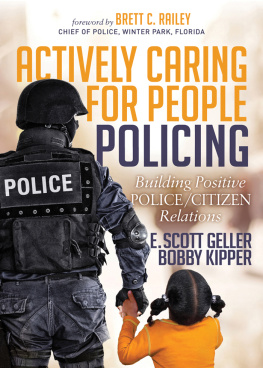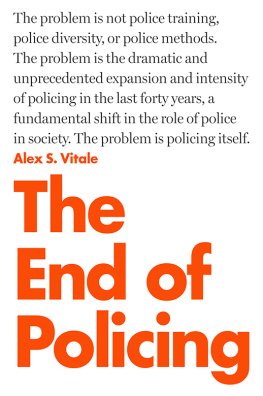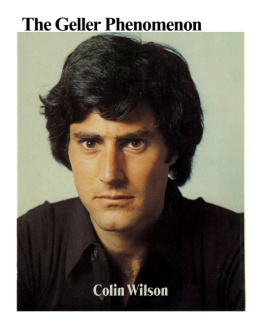ACTIVELY CARING FOR PEOPLE
POLICING
ACTIVELY CARING
FOR PEOPLE
POLICING
Building Positive
POLICE/CITIZEN
Relations
E. SCOTT GELLER1
BOBBY KIPPER2
New York
ACTIVELY CARING FOR PEOPLE POLICING
Building Positive POLICE/CITIZEN Relations
2017 E. SCOTT GELLER & BOBBY KIPPER .
All rights reserved. No portion of this book may be reproduced, stored in a retrieval system, or transmitted in any form or by any meanselectronic, mechanical, photocopy, recording, scanning, or otherexcept for brief quotations in critical reviews or articles, without the prior written permission of the publisher.
Published in New York, New York, by Morgan James Publishing. Morgan James and The Entrepreneurial Publisher are trademarks of Morgan James, LLC.
www.MorganJamesPublishing.com
The Morgan James Speakers Group can bring authors to your live event. For more information or to book an event visit The Morgan James Speakers Group at
www.TheMorganJamesSpeakersGroup.com.
 | ISBN 978-1-68350-055-1 paperback ISBN 978-1-68350-056-8 eBook Library of Congress Control Number: 2016906590 Cover Design by: Rachel Lopez www.r2cdesign.com Interior Design by: Bonnie Bushman The Whole Caboodle Graphic Design Illustrations by: George Wills Blacksburg, VA |
In an effort to support local communities, raise awareness and funds, Morgan James Publishing donates a percentage of all book sales for the life of each book to
Habitat for Humanity Peninsula and Greater Williamsburg.
Get involved today! Visit
www.MorganJamesBuilds.com
Foreword
In 1996, having graduated from high school 20 years earlier, I realized that advancement to senior police administration would require my return to higher education. When searching for a major, I took the advice I had been giving officers under my command for years. I chose a field of study that especially intrigued meApplied Behavioral Scienceresisting the temptation to go the more expedient and natural route and select the discipline I had been working in for the previous 18 yearsCriminal Justice.
As a criminal justice professional, I have always been fascinated with the causes of behavior. Why do people do what they do, and what can be done to improve their behavior? As I progressed to the position of Chief of Police, many opportunities to apply behavioral science presented itself, both in working with the public and with those colleagues I supervised, managed, and/or advised.
I was introduced to the Actively Caring for People (AC4P) Movement by Bobby Kipper, a professional I greatly respect for his forward thinking approaches to not only law enforcement, but to life in general. Kipper, a prolific author, introduced me to Performance Driven Leadership, and my agency became the first Performance Driven Organization in the country.
As Bobby explained the application of Dr. Scott Gellers AC4P principles to law enforcement and public safety, I was instantly excited. I realized that key principles I had studied while pursuing my degree in Behavioral Science were now promoted as a pathway to improve police-citizen relations throughout a community. As I explained the AC4P Policing process to my staff, my excitement became infectious. It quickly became apparent that by engaging in the process of AC4P Policing, we would be furthering basic tenants of proactive community policing.
As you discover the AC4P principles and procedures, I encourage you to expand your perspective beyond traditional law enforcement and consider ways to initiate AC4P Policing in your community. Once you experience the flexibility, practicality, and positive impact of applying AC4P principles for citizen-centered policing, you will behold limitless possibilities for cultivating large-scale beneficial change.
Brett C. Railey , Chief of Police
Winter Park Police Department,
Winter Park, FL
Preface
The Initiation and Evolution of AC4P Policing
Scott Geller coined the term actively caring in 1990 while working with a team of safety leaders at Exxon Chemical in Baytown, Texas. His vision was to cultivate a brother/sister keepers culture in which everyone looks out for each others safety on a daily basis. This requires people to routinely go above and beyond the call of duty on behalf of the health, safety, and well-being of others. The team agreed actively caring for people was an ideal label for this company-wide paradigm shift. Most people do care about the well-being of others, but relatively few individuals act on behalf of such caring in the best ways. The challenge: to get everyone acting effectively on their caringto actively care .
Following the VT tragedy on April 16, 2007 when an armed student took the lives of 32 students and faculty and injured 17 others, the AC4P concept took on a new focus and prominence for Dr. Geller and his students. In a time of great uncertainty and reflection, those most affected by the tragedy were not thinking about themselves, but rather were acting to help classmates, friends, and even strangers heal. This collective effort was manifested in an AC4P Movement for culture change (see www.ac4p.org ), making the belongingness spirit of the Hokie community even stronger. Dr. Geller and his students envisioned spreading this AC4P Movement beyond VT with a basic principle of behavioral sciencepositive reinforcement.
They took the green silicon wristbands, engraved with Actively Caring for People, that Dr. Geller had been distributing at safety conferences for almost two decades, and added a numbering system to enable computer tracking of the AC4P process: See , Act , Pass , and Share (SAPS). The SAPS process asks individuals and groups to look for AC4P behavior (i.e., See) and reward such AC4P behavior with a green wristband (i.e., Act).
Wristband recipients are then requested to look for AC4P behavior from others and pass on the wristband (i.e., Pass). They are asked to document this exchange (including the nature of their AC4P behavior) at the AC4P website ( www.ac4p.org ), along with the wristband number. In this way, a positive recognition process is tracked worldwide (i.e., Share) as positive AC4P communication.
Lets consider the profound value of police officers becoming AC4P agents of cultivating cultures of interdependent compassion. We believe such a proactive AC4P approach would help shift the common perception of the police officer as one who reacts to criminal activity with negative consequences to the police officer as a community servant leader who helps prevent crime with positive consequences. Now more than ever this perceptual and protocol shift is needed.
The Birth and Growth of AC4P Policing
In July of 2015, the vision of AC4P becoming part of the fabric of policing in America became a reality when Bobby Kipper and Scott Geller partnered to establish AC4P Policing. Following a 1.5 day training program, AC4P Policing was piloted in six U.S. cities: Winter Park, FL., Prescott, AZ., Flagstaff, AZ., Coolidge, AZ., Richton Park, IL., and Norfolk, VA. In each of these communities, police officers are now establishing an AC4P Movement of community caring by recognizing the acts of citizens kindness and awarding citizens with positive consequences, particularly an AC4P wristband. This is a dramatic change from traditional policing in which officers focus on catching unlawful behavior and following such behavior with a negative consequence.










